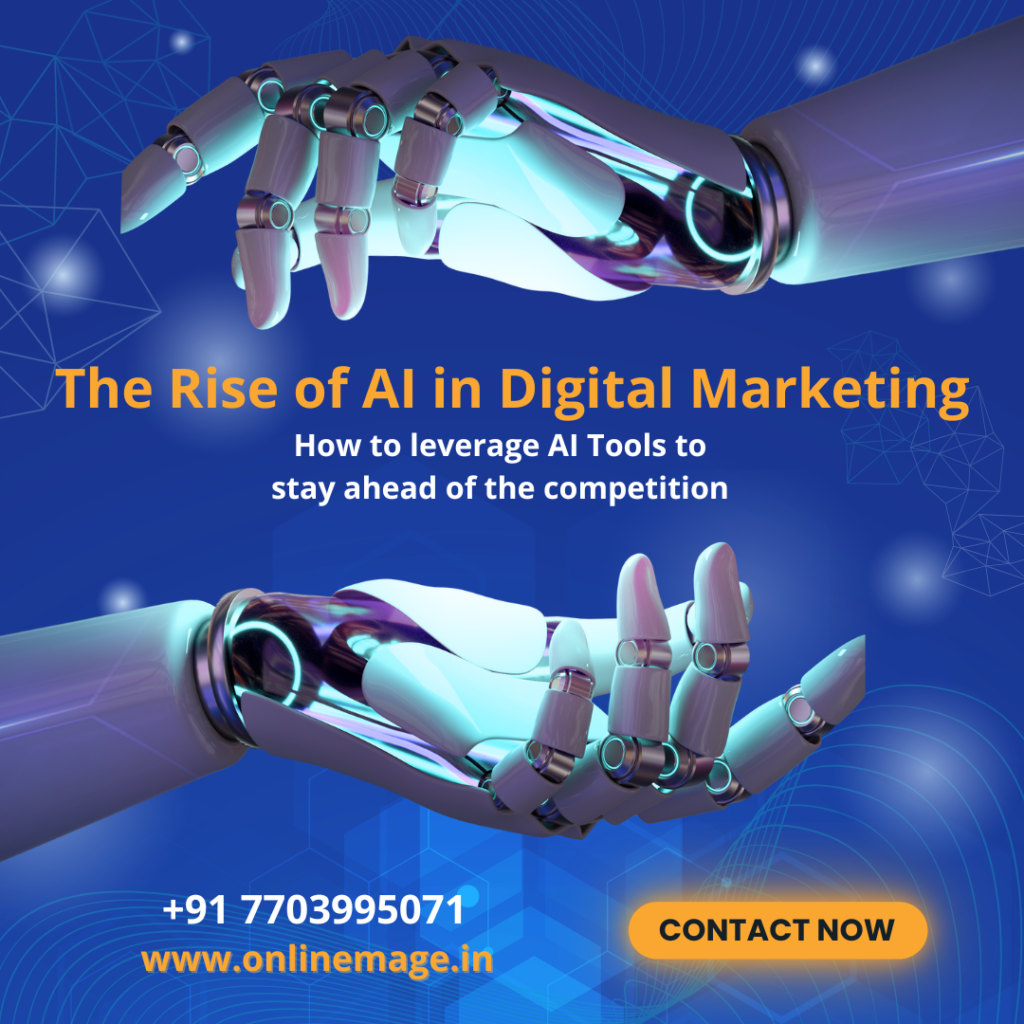
In today’s fast-paced digital world, AI in Digital Marketing is no longer a trend—it’s essential. As more brands embrace artificial intelligence, tools like ChatGPT and Midjourney are reshaping content creation, customer engagement, and data-driven strategies. Leveraging AI in Digital Marketing allows businesses to personalize experiences, automate tasks, and analyze data with unmatched precision. Let’s explore how AI in Digital Marketing can give you the competitive edge you need.
- AI in Digital Marketing for Content Creation
Content is the backbone of digital marketing, and AI is revolutionizing how it’s produced. Tools like ChatGPT and Jasper can generate high-quality, tailored content in seconds. From blog posts and social media captions to email marketing content, AI writers help businesses create diverse and engaging content that resonates with their target audience.
Example: Imagine a company launching a new product. With ChatGPT, the marketing team can quickly generate product descriptions, engaging blog content, and even ad copy for social media. This not only speeds up the content creation process but ensures consistency in brand messaging.
- Graphic Design with AI in Digital Marketing
AI tools like Midjourney, DALL-E, and Canva AI make creating high-quality visuals accessible, even for those with little design experience. With AI’s ability to understand design patterns, color schemes, and themes, brands can create images that reflect their identity and appeal to their audience.
Example: For a small business launching a holiday campaign, Midjourney can help produce festive-themed visuals without hiring a designer. The AI-powered design tools allow brands to adjust aesthetics, colors, and more, all in a matter of minutes.
- AI in Digital Marketing for Customer Support
AI-powered chatbots have become indispensable for providing round-the-clock customer support. Bots like Intercom, Drift, and ChatGPT-powered chatbots can handle routine customer inquiries, such as order status, product information, and account issues. This enables brands to deliver quick responses while freeing human agents to handle more complex cases.
Example: An e-commerce brand that receives frequent customer inquiries can implement a chatbot to assist customers. By answering FAQs, providing personalized recommendations, and even processing returns, AI chatbots improve customer satisfaction and reduce wait times.
- Personalization at Scale: Targeting the Right Audience
AI tools can analyze vast amounts of data to personalize the customer journey, from product recommendations to personalized emails. AI-driven platforms like HubSpot, Salesforce, and Dynamic Yield use machine learning to understand customer behavior, predict preferences, and deliver content tailored to each user.
Example: A streaming service can use AI to analyze viewer behavior and recommend shows that align with each user’s interests. Personalized suggestions keep users engaged, increase time spent on the platform, and ultimately boost loyalty.
- Data Analysis with AI in Digital Marketing
Data is the key to understanding market trends, customer behavior, and campaign performance. AI analytics tools like Google Analytics, Tableau, and IBM Watson enable brands to interpret complex data sets, spot patterns, and even predict future trends. Predictive analytics can guide decision-making, helping businesses adjust strategies based on real-time insights.
Example: For a retail business, AI-powered analytics can forecast demand for different products. By understanding which products are likely to perform well, brands can make informed decisions on inventory and marketing campaigns.
- Voice and Visual Search Optimization: Reach Customers in New Ways
Voice and visual search are becoming increasingly popular. AI-powered tools like Google Lens, Pinterest Lens, and Siri’s voice search help brands reach audiences who prefer searching via images or voice commands. Brands optimizing their content for these methods can improve visibility and reach.
Example: A furniture retailer can optimize its images for Google Lens, so customers searching for “modern wooden table” can easily find its products. This expands the brand’s visibility and captures the growing audience using non-traditional search methods.
- Email Marketing Automation: Smart Campaigns for Better Engagement
Email remains a powerful tool for digital marketing, and AI tools like Mailchimp, Klaviyo, and Constant Contact have taken it to the next level. These platforms use AI to segment audiences, personalize email content, and optimize send times, ensuring maximum engagement.
Example: For a clothing brand, AI-powered email marketing can automatically send targeted campaigns based on customer preferences and behavior, like sending a discount code for a frequently viewed item. This level of personalization can significantly improve open and conversion rates.
How to Get Started with AI in Digital Marketing
- Identify your needs: Choose an AI tool based on your business’s specific challenges, like content creation, data analysis, or customer support.
- Invest in training: Familiarize your team with the selected AI tools to maximize their potential.
- Integrate AI into your existing strategy: Use AI to complement, not replace, your current marketing efforts.
- Monitor performance: Continuously assess the impact of AI on your marketing KPIs to refine your approach.
Conclusion: Embrace AI for a Competitive Edge
AI is no longer just an option for digital marketers; it’s becoming essential to stay relevant and competitive. From generating unique content to offering personalized customer interactions, AI tools can unlock opportunities to engage audiences in new ways. By incorporating AI into your strategy, you’ll not only streamline operations but also deliver a better, more responsive customer experience.
Hi, this is a comment.
To get started with moderating, editing, and deleting comments, please visit the Comments screen in the dashboard.
Commenter avatars come from Gravatar.